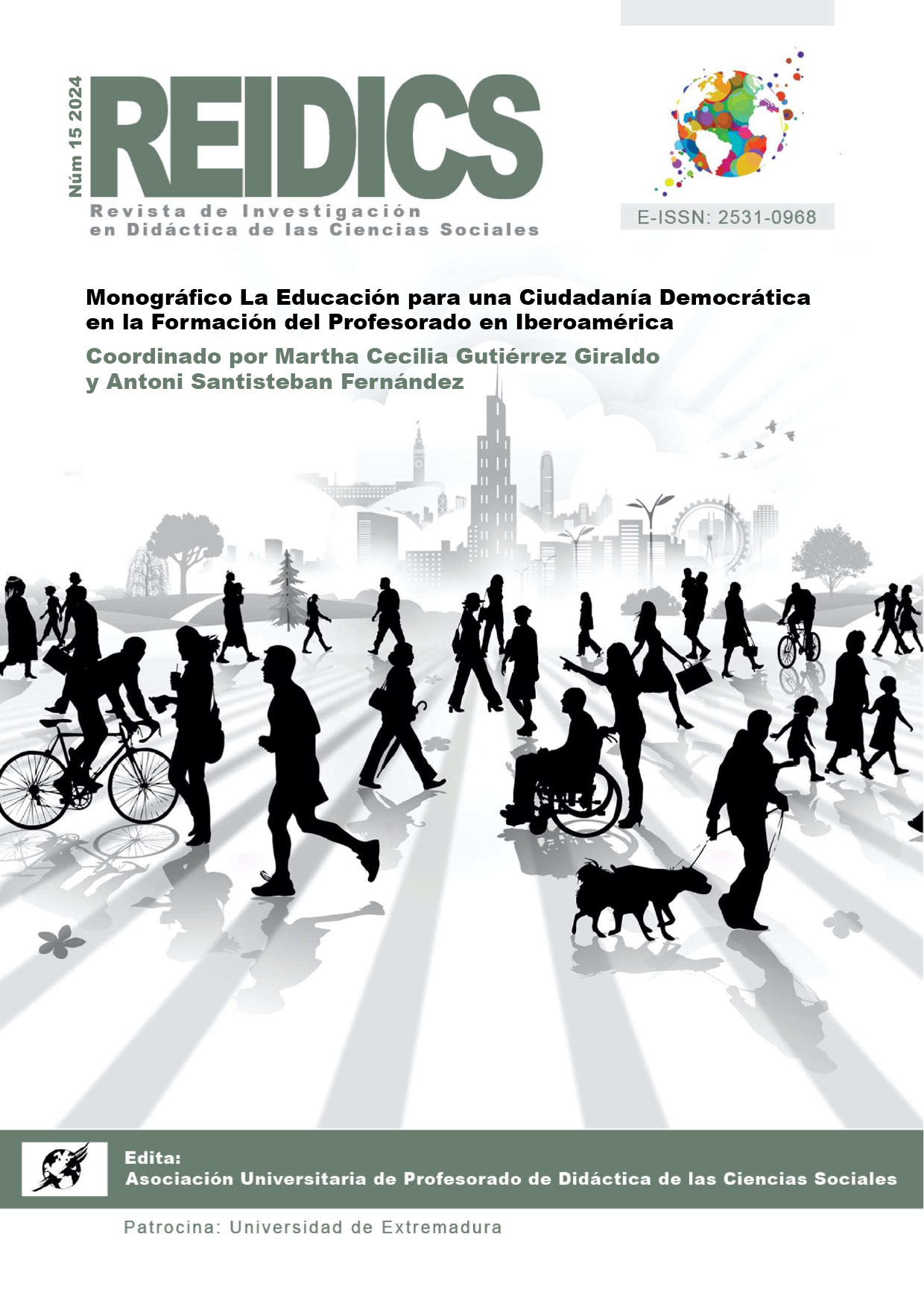Education for democratic citizenship: from initial teacher training to classroom practices in Portugal
DOI:
https://doi.org/10.17398/2531-0968.15.62Keywords:
Educational practices; competences for a democratic culture; critical citizenship; initial teacher training; didactics of social sciences.Abstract
Teacher training, at Escola Superior de Educação de Lisboa, has since 2020 included a curricular unit in the master's degree in Teaching in the 1st cycle and Portuguese and History and Geography of Portugal in the 2nd cycle, which aims to develop Competences for Democratic Culture (CDC).
Taking as a reference the 20 CDC (Council of Europe, 2017), the training component in the field of Didactics of Social Sciences (DSS) was reformulated, introducing changes in the curricular unit Society, Culture and Territory. These changes have produced visible results in supervised teaching practices (6-12 years old).
This article focuses on critical reflection on the teaching and learning strategies experienced in initial training, within the scope of DSS, mobilized in the practices with students aged 6 to 12. The objectives are: (1) to recognize the effects of the strategies implemented in initial training in the field of CDC; (2) analyse the skills developed by elementary school students and reflect on the practices for the development of these skills; (3) analyse the CDC valued in students' practices and the results of their pedagogical-didactic projects.
Methodologically, a documentary analysis is carried out that frames the CCD in initial teacher training and a content analysis of the twelve final master's reports (2021 to 2023), which focus on a pedagogical-didactic intervention and research on development of CDC (strategies, activities and evaluation indicators).
The first result points to the recognition of the role of DSS in initial training within the scope of CDC: through content and training methodologies, SS facilitate practices aimed at building critical and democratic citizenship. Secondly, the impact of projects implemented in elementary school classes is highlighted, with the purpose of promoting CDC: evidence of the relevance in guiding future teaching practice towards training children and young people to read, interpret critically and intervene in the social reality in which they are inserted.
References
Arató, F., y Varga, A. (2015). A Handbook for learning together – an introduction to co-operative learning. University of Pécs.
Cachinho, H. (2017). Criar asas: dos desafios da formação de professores de geografia na pós-modernidade. Revista de Educação Geográfica,1, 9-19. https://doi.org/10.21747/GeTup/1a1
Conselho da Europa (2017). Competências para uma Cultura da Democracia. Viver juntos em igualdade em sociedades democráticas culturalmente diversas. Conselho da Europa.
Dias, A. (2021). Prática de Ensino Supervisionada em História e Geografia de Portugal no 2.º CEB: perspetiva crítica para a mudança. Da investigação às práticas. 1(11), 80-101. https://doi.org/10.25757/invep.v11i1.225
Dias, A., y Hortas, M. J. (2015). Desenvolvendo Competências Investigativas em Estudo do Meio no 1.º CEB: Abordagens a partir da Didática da História e da Geografia. Saber & Educar, 20, 188-200. 10.17346/se.vol20.160
Estrela, A. (2002). Modelos de formação de professores e seus pressupostos conceptuais. Revista de Educação, XI(1), 17-29.
Gramsci, A. (1970). Introducción a la filosofía de la praxis. Ediciones 62.
Guerra, I. (2002). Fundamentos e Processos de uma Sociologia de Acção. O Planeamento em Ciências Sociais. Principia.
Hortas, M. J., y Dias, A. (2023). In M. E. Cambil, A. R. Fernández y N. De Alba (Coord.) La Didáctica de las Ciencias Sociales ante el reto de los Objetivos de Desarrollo Sostenible (pp. 629-637). Narcea.
Jiménez, M. D., y Felices, M. M. (2018). Cuestiones socialmente vivas en la formación inicial del profesorado. La infancia refugiada siria como problemática. REIDICS. Revista de Investigación en Didáctica de las Ciencias Sociales, 3, 87-102. http://dx.doi.org/10.17398/2531-0968.03.87
Jófili, Z. (2002). Piaget, Vygotsky, Freire e a construção do conhecimento na escola. Educação: Teorias e Práticas, 2(2), 191-208.
Marcelo-Garcia, C. (1999). Formação de professores. Porto Editora.
Márquez de la Plata, J., y González, G. (2002). Las actividades de enseñanza como punto de partida para el cambio real en la formación inicial del profesorado de primaria. In J. Estepa-Jiménez, M. de la Calle y M. Sánchez-Agustí, Nuevos horizontes en la formación del profesorado de Ciencias Sociales (pp. 499-514). AUPDCS, Editorial Libros Activos.
Ortega y Gasset, J. (2016). O que é a filosofia? Cotovia.
Slavin, R. (1980). Cooperative learning. Review of Educational Research, 50(2), 315-342. https://doi.org/10.3102/00346543050002315
Tutiaux-Guillon, N. (2013). Réflexions sur la recherche en didactique de l’histoire, la géographie et l’éducation à la citoyenneté. In J. Pagès y A. Santisteban (Eds.), Una mirada al passado y un proyecto de futuro. Investigación e innovación en didáctica de las ciencias sociales (Vol. 1, pp. 563-576). AUPDCS, RIDCS e UAB.
Downloads
Published
Issue
Section
License
Copyright (c) 2024 Alfredo Gomes Dias, Maria João Barroso Hortas

This work is licensed under a Creative Commons Attribution-NonCommercial-ShareAlike 4.0 International License.
Aquellos autores/as que tengan publicaciones con esta revista, aceptan los términos siguientes:
- Los autores/as conservarán sus derechos de autoría y garantizarán a la revista el derecho de primera publicación de su obra, el cual estará simultáneamente sujeto a la Licencia de reconocimiento de Creative Commons 4.0 BY-NC-SA que permite a terceros compartir la obra siempre que se indique su autor y su primera publicación en esta revista.
- Los autores/as podrán adoptar otros acuerdos de licencia no exclusiva de distribución de la versión de la obra publicada (p. ej.: depositarla en un archivo telemático institucional o publicarla en un volumen monográfico) siempre que se indique la publicación inicial en esta revista.
- Se permite y recomienda a los autores/as difundir su obra a través de Internet (p. ej.: en archivos telemáticos institucionales o en su página web) antes y durante el proceso de envío, lo cual puede producir intercambios interesantes y aumentar las citas de la obra publicada. (Véase El efecto del acceso abierto).
- Los autores y autoras han respetado la política de autoría de esta revista.







